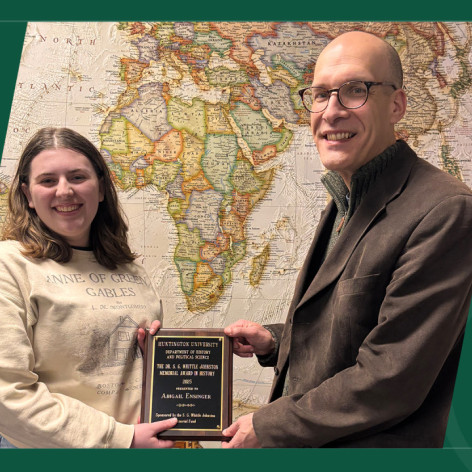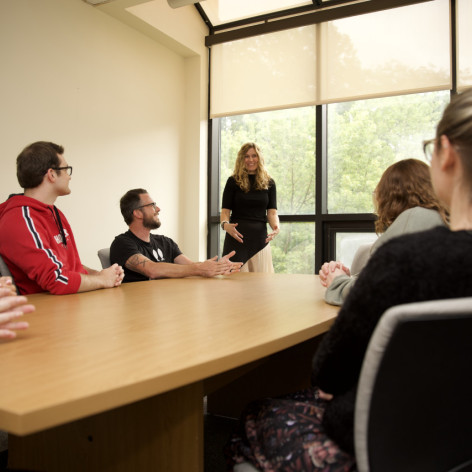Webb writes book in Complete Idiot’s Guide series
FOR RELEASE: Thursday, February 12, 2004
Huntington, Ind. " Not many college professors are referenced in the same sentence with the words complete idiot. For Huntington College history professor Jeffrey Webb, being mentioned in the same breath as those words represents a career accomplishment as he has authored his first book, The Complete Idiot's Guide to Christianity Today. Though this achievement may not seem unusual for college professors, the way in which Webb started the project was. A literary agent was asked by the editorial staff of the book series to locate an expert who might be willing and able to write a book detailing the differences among the Christian denominations, said Webb, assistant professor of history since 1999 at Huntington College. She found my personal web site at HC through a search engine query on studies in Christianity. She contacted me in March of 2003, along with several others, and I was invited to submit an outline and sample chapter for the editors to review.
The editors were impressed with Webb's submission and extended the contract to him. He immediately began working in April to reach a tight mid-summer deadline. A rigorous editing process followed in the fall, and the project to be completed in six months time.
The Complete Idiot's Guide to Christianity Today will focus on denominations and the history of the Church. It is a contemporary statement about the present condition of the Christian faith, presenting differences among Christian denominations.
I discovered through the process of writing that I could not do this without going back through the history of the church and identifying reasons for the different conflicts and schisms that produced the denominational divisions, Webb recalled. Yet, I also tried to emphasize the points of agreement and unity among Christians.
Since the book situates denominations in an historical context, Webb was able to provide starting points from the courses he teaches at HC, such as History of Christianity and American Religious History. And with such a tight schedule, Webb was grateful to receive assistance from several Huntington College history and English majors. Dwight Simon, Joni Michaud, Tara Enck and Danielle Villafana helped develop research from the library by searching for articles on topics from a detailed outline.
During such an intense and in-depth process of research and writing, Webb, who was named the 2003 Huntington College Professor of the Year, developed a deeper appreciation for the many denominations of the Christian faith.
This past summer, I was alone for extended periods of time, including six or seven overnight stretches, to get it done. Being immersed in this topic was rather like being held hostage by the subject, Webb admitted. People who've been kidnapped for a long time sometimes end up sympathizing with their captors. I would spend a week with Catholicism for 16 hours a day and begin to appreciate things about Catholic theology. Then I would start a chapter on Lutherans and learn to appreciate their approach.
Since the book is a part of the Complete Idiot's Guide series, Webb faced a strict template for the book's organization and structure. He was required to include a specific number of major parts, chapters and pages and was challenged with grouping and categorizing denominations in a way that wouldn't offend anyone.
Making Christianity fit into 356 pages was an incredibly taxing exercise, Webb said.
Not only did Webb have to meet the challenge of both tight deadlines and structure, but he also had to capture the dynamic essence of the Christian faith into a still summary.
It's like taking a photograph of Christianity, Webb explained. Photographs are great, but they have problems. They are a static, still image of a specific moment in time, but Christianity is continually developing. The Church is always moving, and it's difficult to know what issues will be relevant and what won't be even in the six months from the time I wrote the manuscript to the time the book is scheduled to appear. It was hard trying to make choices about what went into the book and hoping that it would be an honest portrayal of the subject and an accurate snapshot of Christianity.
While the book deals mainly with differences between denominations, Webb also incorporated discussion about the points in common between Christians. He included the integrating aspects of Christian worldview between denominations.
I really marveled at the richness of the Christian faith, Webb said. I learned how it is lived and has been experienced in ways that are off my radar screen. I was able to come to terms with a much greater breadth and depth of the Christian faith, which made me much more appreciative. I thought it was incredibly enriching to try to conceptualize the Christian faith but doing it in a way that is accessible. I do believe there was providence in this opportunity.
Webb's book, which he hopes will serve as a reference for people involved in church work, as well as to students and media seeking a quick summary of Christian denominations, is due to be released in March by Alpha Books.
I would be really tickled if groups of Christians found it to be a useful tool as they think through the nature of the Christian faith, Webb said.
Dr. Jeffrey Webb earned a BA degree in history from Baldwin-Wallace College in 1987. In 1989, he received a MA in history from Cleveland State University. In 2001, Webb accomplished a PhD in history from the University of Chicago.
Huntington College is a comprehensive Christian college of the liberal arts offering graduate and undergraduate programs in more than 60 academic concentrations. USNews & World Report ranks Huntington among the top comprehensive colleges in the Midwest. Founded in 1897 by the Church of the United Brethren in Christ, Huntington College is located on a contemporary, lakeside campus in Huntington, Indiana. The College is a member of the Council for Christian Colleges and Universities (CCCU).



